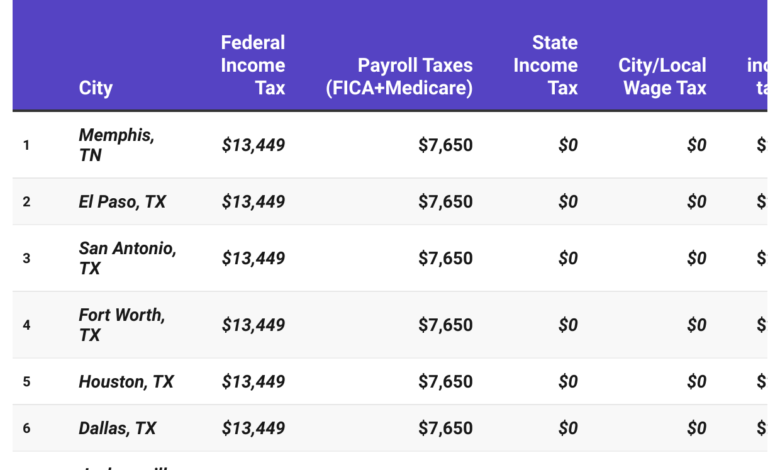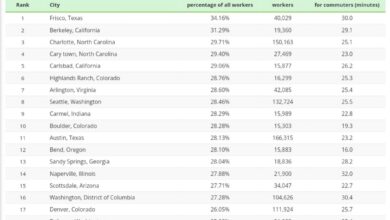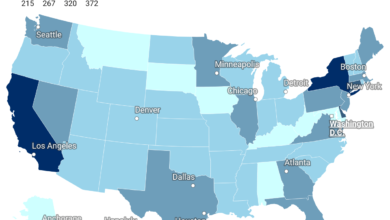Best & Worst Cities for a $100k Salary in 2025 (After Taxes + Cost of Living)
Where $100,000 Goes Furthest in 2025: A 30-City Comparison

A six-figure salary once symbolized financial comfort almost anywhere in the United States.
Key Takeaways
- Taxes alone don’t tell the full story. Houston outpaces San Francisco not just because of lower taxes but also because of dramatically cheaper housing and services.
- The $100k benchmark is relative. In New York, it buys a lifestyle similar to a $60k salary in the average U.S. city. In Houston or Indianapolis, it feels closer to $95k–$100k.
- Geography is financial leverage. Remote workers can give themselves a massive “raise” by moving from expensive coastal hubs to mid-sized metros without changing jobs.
In 2025, however, the value of $100,000 depends heavily on location. Taxes and cost of living can erode—or dramatically enhance—how far your paycheck stretches. We compared 30 major U.S. cities by modeling after-tax income and adjusting for local prices to find where $100,000 provides the most real-world spending power.
How the Numbers Were Calculated
We started with a gross annual salary of $100,000 for a single filer in 2025. From there, we accounted for several layers of financial reality:
- Federal Income Tax – applied the 2025 tax brackets and standard deduction ($15,750 for single filers).
- Payroll Taxes – included Social Security (6.2% up to $176,100) and Medicare (1.45%).
- State & Local Income Taxes – reflected each state’s tax system plus city wage or occupational taxes where applicable (e.g., New York City, Philadelphia, Detroit, Baltimore, Columbus, Louisville).
- Sales Taxes – estimated annual burden assuming 30% of income is spent on taxable goods and services, multiplied by local combined sales tax rates.
- Cost of Living Adjustment – used BEA Regional Price Parities (RPP) to translate after-tax income into “national average dollars.” This makes a dollar in Houston directly comparable to a dollar in New York.
The result: COL-adjusted spending power, a measure of what $100k truly buys in each city.
The Cities Where $100k Goes Furthest
Southern and Midwestern metros dominate the top of the list. Houston, Dallas, San Antonio, Jacksonville, and Nashville all rank high thanks to no state income tax and below-average costs of living. In the Midwest, cities like Indianapolis, Kansas City, Columbus, and Detroit deliver solid purchasing power with modest taxes and relatively affordable housing and services.
Middle of the Pack: Growth Hubs With Trade-Offs
Cities such as Denver, Phoenix, and Atlanta strike a balance. They have reasonable taxes and growing economies, but rising housing costs and steady population growth eat into the advantage. These metros remain appealing for professionals but don’t stretch $100k as far as smaller Midwestern or Southern counterparts.
The Most Expensive Cities for a $100k Salary
Not surprisingly, coastal cities fall to the bottom of the ranking. New York City, Los Angeles, San Francisco, and Seattle offer cultural and career opportunities but impose high taxes and steep living costs. For example:
- New York City combines state income tax, city tax, high sales taxes, and an RPP well above 100, leaving a $100k salary feeling closer to $60k nationally.
- San Francisco and Los Angeles are pulled down by California’s income tax and some of the highest housing costs in the country.
- Seattle, despite Washington’s lack of income tax, suffers from sales taxes over 10% and a very high RPP.
Cities With Unique Tax Challenges
- Philadelphia: The only major city with a substantial wage tax (3.74%), which layers on top of Pennsylvania’s flat state income tax.
- Baltimore and Louisville: Both impose occupational or local income taxes that noticeably reduce net pay.
- Washington, DC: Operates its own tax brackets, making its burden heavier than surrounding states, though COL is slightly lower than New York or San Francisco.
In 2025, $100,000 can provide comfort or barely cover the basics, depending on where you live. For those prioritizing lifestyle and financial breathing room, Southern and Midwestern cities shine as the best choices. For those who value career opportunities or cultural access in coastal hubs, the trade-off is clear: a six-figure salary doesn’t stretch as far as it used to.




